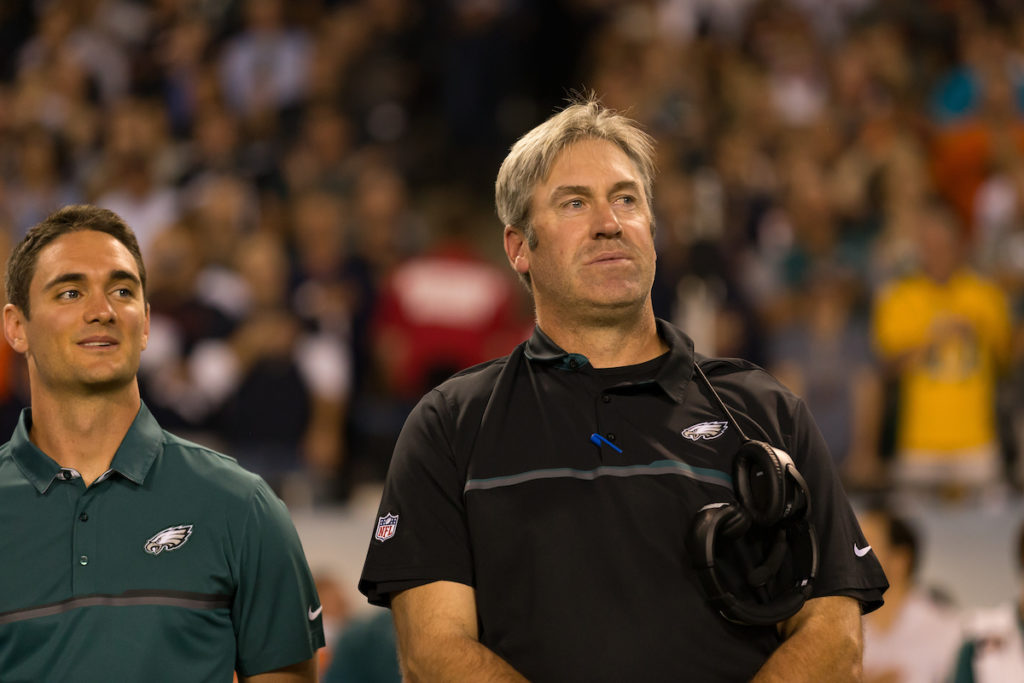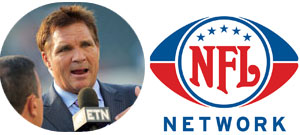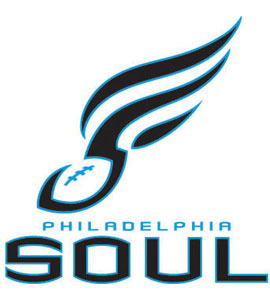EAGLES HEAD COACH DOUG PEDERSON PRESS CONFERENCE OCTOBER 26, 2016
admin
 Doug Pederson
Photo by conbtrastphotography.com
Doug Pederson
Photo by conbtrastphotography.comDOUG PEDERSON: First of all, good morning. Let me update you on these injuries: So, the only two that we have that won’t practice today – and they’re really still kind of week-to-week – are Kamu [Grugier-Hill] with the hamstring strain and Bennie Logan with the left groin strain. So, both of those [guys] will not practice today.
Mychal Kendricks, Jordan Matthews, Leodis [McKelvin], Jason Peters – the guys I mentioned on Monday – all four of them will practice today and will be obviously available for the game.
Q. In terms of the 53-man roster, why add a defensive lineman as opposed to a defensive back?
DOUG PEDERSON: Well, right now with the injury to Bennie [Logan], you’re down to three [defensive tackles]. [With] as much rotating as we do with that group, we felt the need to bring a fourth in.
Q. Both you and Dallas are at the top with regard to rushing attempts per game and at the bottom of the league in pass attempts. Just with respect to your team, do you think that would be any different if you had a veteran quarterback? How much of it is Carson Wentz-related?
DOUG PEDERSON: You know what, I don’t think so. I don’t think so. And I say that because both teams have the ability to run the football. It just helps your passing game. I think both teams know that we both have young quarterbacks and we’ve got to rely a little bit on defense, got to rely on special teams, and that running game becomes so important the challenge is obviously on the offensive line and the runners.
It’s also been a formula league-wide. You’re seeing teams that are having success because they’re running the ball, and that’s okay. That’s okay. As long as you can do that and you still find a way to win the game, then I’m okay with that, too.
Q. But you came from a system, at least the coach of a system, that generally didn’t run the ball very much, was more pass first. Is this where you stray from Kansas City Chiefs head coach Andy Reid?
DOUG PEDERSON: I think a little bit I do, but at the same time, I think too that sometimes games dictate that; the personnel dictates that. I’ve played the quarterback position and I know how important the run game can be. [It can be] your friend, and it just opens up so much – it opens up your drop-back game, it opens up your play-action pass game.
So, I just think that where we are right now, yeah, we’re going to continue to pound the football and utilize our passing game where we see fit and how we’re also protecting during that game.
Q. With Wentz and Cowboys QB Dak Prescott, do you see any similarities between those two, and what are some of the differences?
DOUG PEDERSON: Well, the similarities, No. 1, they’re proven winners. They know how to win. They know how to lead their teams. Nothing seems to be too big for either one of them. They take it in stride, the ability to protect the football I think through these first six, seven games like this has been crucial.
You know, differences, I think Carson could be a little bit bigger. They’re both very athletic, though. That’s a similarity. And not really knowing him [Prescott] personally and just knowing our guy, I think they both prepare extremely well. [They] definitely utilize their strength of their team – two good offensive lines, two good run games. I mean, they’re probably more similar than they are not, you know, in my opinion.
Q. With Carson and Dak, why are they more ready for the NFL from where they came from. Why does it seem more young quarterbacks are more ready when they come to the NFL?
DOUG PEDERSON: I just think these guys are … they’re coming out of school, out of college a little more NFL ready, a little more NFL prepared to handle, No. 1, the rigors of an NFL season. These guys come out of – I know Carson, North Dakota State versus SEC or Pac-12 or whatever – but they know how to handle success. They know how to handle media. They know how to handle fans. I think they’re just genuinely more prepared coming to us at this level.
And then to their credit it’s how well they’ve prepared themselves to be in this position. They all strive to one day play in the National Football League, and it’s their goal to play in the National Football League. These guys are vowed and determined to one day get there, so they set goals for themselves, and then when they’re here, they want to see the field, and when they do, it’s just how well they handle it all.
Both guys are … I think in our case, how well he [Wentz] prepares himself during the week, his leadership ability. And all that is just taught at an early age and you kind of just have it, and some guys have it, some guys don’t. Both of these guys have it.
Q. Based on what you just said about Prescott, are you surprised that he lasted until the fourth round? And is that something you kind of tell right away about a quarterback, like how he has it or not?
DOUG PEDERSON: In a quarterback situation, you’re not going to really know until you get him in your building and you start working with the kid and get him introduced to your system. Depending on where you fall in the draft, it’s all based on what a team needs, obviously, at that time. I mean, [Patriots QB] Tom Brady — you could go down the list of guys that got passed up over time. I’m not surprised that Dak is having the success he’s having. I think he’s that type of guy. We had him here this spring in our building and I really liked him, liked everything about him as a quarterback. I think you do your due diligence on all the quarterbacks in the draft, those that are say on the upper half of the board, and you just want to make sure that you’re exhausting everything about them.
So, wherever you end up, you just have to – once you get there – make the most of that opportunity, and he’s obviously done that.
Q. Having Prescott and Cowboys RB Ezekiel Elliott in that offense, how formidable are they?
DOUG PEDERSON: Yeah, both these guys are playing extremely well, at a high level right now, but it’s that offensive line that has really kind of taken it upon themselves to, No. 1, protect Dak and then open up the lanes for Zeke [Ezekiel Elliot]. We all know the type of runner that Elliott is, and it’s no surprise that he’s having the success, either, that he’s having, based on his ability and what he can do out of the backfield – run and catch the ball. But it really starts with that offensive line, and then obviously Dak protecting the football and not hurting that team.
Q. As a head coach, how do you approach a rivalry week like this? I know that every game is supposed to be the same, but what do you tell some of the young guys who maybe don’t know about it and how much it means to the city?
DOUG PEDERSON: Yeah, I think your approach, for me, is not going to be really any different than previous weeks. It’s a division game. We know that. We slipped up earlier in the division. You remind the team that if you want to be one of the teams at the end of the year, you’ve got to handle your division opponents, all that, and coaches around the league are telling their teams that when it comes to division games.
You can also visit a little bit of the history of this game and the times that I played here and coached here before and just talk about it. It is a little bit different, but our guys have just got to come ready to play, and it’s a road game. Obviously we lost to Washington on the road there, and we’ve got to make sure we handle that. And it’s Sunday Night Football, the pressure of that and playing, and we can lean back on the Monday night experience a little bit there. But you just try to keep it as business as usual as you go through the week.
Q. Even though you’ve had all three tight ends back healthy, you’ve continued to use G/T Matt Tobin in the Jumbo Package. Generally, you’ve run out of those sets. Is there a disadvantage when you do that because teams know what’s coming, or do you feel like the size will —
DOUG PEDERSON: Teams that do that, tend to run the ball a little bit more in those situations, and just even the other day against Minnesota, they knew exactly where we were going to run and it’s still an 8-yard gain. So I don’t put a lot of emphasis really on personnel on the field. Does it give us a little leg up sometimes in the run game? Yes. Does it tip our hat? Probably. But at the same time, we also have throws that we could design and have up in those situations to kind of counteract that.
Q. Is that something you would have ever used had you not had injuries at the tight end position? Or did those injuries kind of breed that personnel usage?
DOUG PEDERSON: Well, early in the season, the injuries obviously kind of led into us having that extra tackle play those positions. And then in the Monday night Chicago game, we had both Wiz [C/G Stefen Wisniewski] and Tob [Tobin] on the field at the same time.
It’s something that we utilize every week. We’re putting things in in the run game and in the pass game a couple times. In fact, last week we had a couple throws with Tobin in the game; we just didn’t get to them. We just didn’t call them.
It’s something we’re going to continue to work. It’s great in short-yardage, [it’s] great in goal-line situations obviously, and the ability to run the football with a bigger body can help. These defensive ends are pretty good players, so a bigger body on them, as well.
Q. Coming off of QB Carson Wentz’s performance against the Vikings, what are you, quarterbacks coach John DeFilippo and offensive coordinator Frank Reich doing this week in terms of coaching and points of emphasis for your rookie quarterback?
DOUG PEDERSON: Well, it starts with fundamentals and it starts with mechanics. He missed a few throws to his left: some wide-open throws to his left. [Throws to TEs] Trey Burton and Zach Ertz, to name two. So we’ve got to get him refocused on just his fundamentals. Right-handed quarterback, [so] hips, shoulders, eyes, all that, feet, working to the left. That’s an ongoing [process]. It goes all the way back to what we mentioned even in training camp with the fundamentals and mechanics. We’re constantly every day working on that with him.
And then the other thing that we’re seeing and that we’re getting him, is situational football: just knowing down and distance and it’s third down, if it’s second down, [if it’s] first or second down, what are defenses trying to do? Who do we have in the game personnel wise? Those are all things now that we’re trying to bring into his game, and he understands that. Now it’s just sort of [that] we have to magnify it just a little bit. He has to know if [RB] Darren Sproles is in the backfield as opposed to [RB] Ryan Mathews or Wendell [RB Wendell Smallwood] because angles change on the run game and things like that. We keep constantly talking about these issues each and every week because every week is a little different.
Q. What about Wentz’s fundamentals when he is throwing to the left? What specifically are you telling him?
DOUG PEDERSON: Specifically his target line, meaning his feet, his shoulders and his eyes being in line with his target. When he doesn’t open up his front hip, he tends to — and most quarterbacks would say, and this happens to him — if he doesn’t open up his left hip, let’s say, he’s going to throw the ball behind [the receiver]. If he over-strides, the ball is going to sail. So those are all things that we keep working on in practice and try to put him in game-like situations in our drill work to help him just sort of eliminate some of that stuff to his left.
Q. There have been a few reports that the Eagles are looking to trade for a wide receiver prior to the trade deadline. Is there any legitimacy to that and are you happy with your current receivers?
DOUG PEDERSON: There’s no legitimacy to that, and I’m thrilled with the guys we have and going to work with them every day.
Q. Your tight ends have caught only eight passes in the last three games. Only three of those receptions have gone for first downs. Is that a concern? Is it just the way things have gone in those games?
DOUG PEDERSON: It’s a little of both, but I’ll tell you this: It’s more just the way things have gone, and this kind of goes back to Sal’s [ESPN reporter Sal Paolantonio’s] question on getting Carson familiar with who’s on the field and knowing concepts and knowing coverage and things like that.
As quarterbacks, we’re constantly learning every single week and every week is different. So sometimes it’s just understanding the design of a play and knowing what the defense is giving us. It’s not a scheme thing, it’s not a personnel thing or anything like that. It’s just now we’ve just got to make sure that we’re all on the same page, offensively, with some of the things that we’re doing.
Q. So to be clear, you guys aren’t trying to upgrade at the wide receiver position in front of the trade deadline?
DOUG PEDERSON: Well, look, you say ‘upgrade.’ I think every team is trying to upgrade every position if you could, but not at this time, no.
Q. In your current receiving corps, who stretches the field?
DOUG PEDERSON: Nelson [WR Nelson Agholor] can stretch it; Josh [WR Josh Huff] can stretch it. But I think it’s protection and design of the play. When I think of stretching the field, I mean, a guy can run fast and that can be stretching the field, but who can really take the top off? Those two guys are two that can do that — and [WR] Bryce Treggs.
Q. What’s keeping guys like Agholor and Huff from being more consistent?
DOUG PEDERSON: Well, I thought Josh was pretty efficient last week. He caught some nice balls: a couple in the red zone, and a couple of bubble-slant combinations that we do with him. And that’s kind of who Josh is. And then he had the kickoff return [for a touchdown], obviously. These are things Josh can do.
He’s another one, much like DGB [WR Dorial Green-Beckham], that you try to find [more opportunities for] every week. You know, when you have 22 or 23 pass attempts and another 26 or so running attempts, there’s just not that many plays. And so, we have them in every week, it’s my job, I guess, to call them in situations where we can utilize them. Sometimes it’s just the circumstance of the game.
Q. With the running game and the defense being a big part of the formula, would you say it’s accurate to use the term ‘game managers’ when you talk about Cowboys QB Dak Prescott and Wentz? And why is the term ‘game manager’ not a negative way to describe a quarterback?
DOUG PEDERSON: Yeah, I obviously don’t think it’s a negative way to describe any quarterback, if Number One, they’re efficient with their throws [and have a] high completion percentages say in the mid-to-upper 60s. [If] they’re not turning the football over. I think play callers can help in that situation.
You take more calculated risks than just winging the ball or just trying to attempt at a throw. I think there’s a little bit more calculation involved there from play callers and design. And in our case, I think the way he [Wentz] manages our run game. We do ask our quarterback to put us in run left to run right or things like that based on front and coverage and everything that teams do. He manages the game from that standpoint sometimes, and that helps us.
You know, if you’re efficient throwing the ball, again,[in regards to] completion percentage, you’re not turning the ball over, and you’re converting on third downs, then that’s a pretty good way to manage the game.
Q. You’re going to be indoors on Sunday night. The last time you played there were some communication issues. How do you get ready, besides just jacking up the crowd noise in practice?
DOUG PEDERSON: Yeah, we’ve just got to [have a] point of emphasis this week with the silent cadence, and we’ve obviously got to iron out some issues with [C Jason] Kelce and Carson that we saw in the game the other day. We’ll fix those. We’ve just got to keep hammering away, and I’ll have an opportunity this week to go indoors and crank the noise up again and just keep chiseling away at it and go from there.












